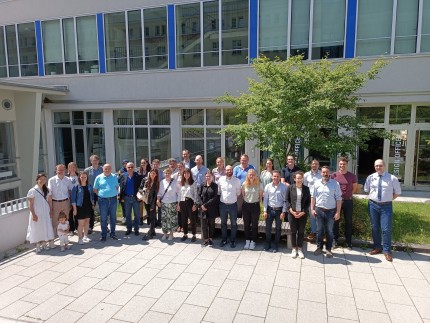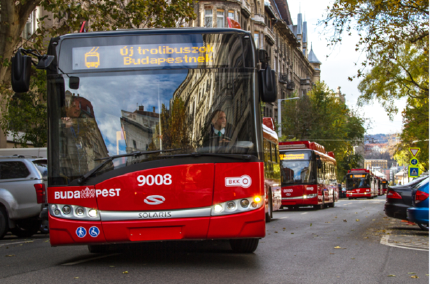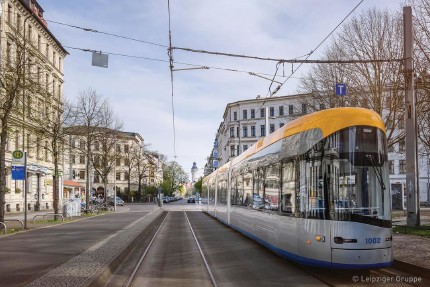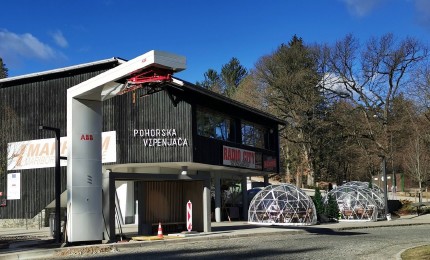Energy Efficiency for Public Transport Infrastructure in Central Europe: EfficienCE successfully delivered
30.06.2022
Three years passed since a new Central European cooperation project has been kicked off. Twelve partners, including seven public transport authorities/companies from seven countries worked together to explore and test energy efficiency measures and the role of renewable energies in public transport systems and to contribute to the EU’s White Paper goals to cut transport emissions by 60 percent by 2050 and to halve the use of conventionally fuelled cars in urban transport by 2030.

Photo: EfficienCE partners at the Final Conference in Leipzig (City of Leipzig)
EfficienCE is a cooperation project funded by the Interreg CENTRAL EUROPE programme that aims at reducing the carbon footprint in the region. Most Central European cities have extensive public transport systems, which can form the basis of low-carbon mobility services. More than 63% of commuters in the region are using public transport. Measures to increase the energy efficiency and share of renewables in public transport infrastructure can thus have a particularly high impact on reducing CO2.
This was achieved by supporting local authorities, public transport authorities and operators by developing planning and financing strategies and action plans, implementing pilot actions, developing tools and trainings to plan and operate low-carbon infrastructure, and by transferring knowledge and best practices on energy-efficient measures across Central European regions.
A transnational guide and four transnational handbooks were prepared within the EfficienCE project and translated in all Central European languages. The transnational guide on recommendations for policies, legal and institutional frameworks describes the project’s activities and results in developing the action plans and implementing pilots to 1. increase the share of RES (renewable energy sources) integration, 2. enable multipurpose usage of PT infrastructure, and 3. share and use data to plan for energy-efficient public transport infrastructure. The document contains the partners’ recommendations based on their approaches to public transport infrastructure planning, testing, and evaluation.
The Municipality of Bergamo (Italy) aimed to increase the share of RES in the public transport infrastructure. The developed action plan examines the European, national and local regulatory framework for energy and mobility, existing local plans and studies for mobility & energy including the SUMP, and their interrelation.
Multipurpose use of PT (public transport) infrastructure means to use existing or new public transport infrastructure to charge different types of e-vehicles. Municipality of Maribor (Slovenia) developed a line electrification hierarchy with technical and economic feasibility analysis for solutions. The action plan supports the strategic objective to fully electrify the city’s public transport by 2030. BKK Centre for Budapest Transport, the public transport authority of Budapest (Hungary) developed an electrification strategy with scenarios to reach its goal to fully electrify public transport by 2050.

Photo: New trolleybuses in Budapest (BKK Centre for Budapest Transport)
The City of Leipzig together with LVB developed a use case for energy-efficient PT infrastructure -planning to test and further develop their urban data platform. For the use case, large amounts of data from on-board computers and Raspberry PI sensors in trams were linked with other data sources.

Photo: Tram line in Leipzig (City of Leipzig)
Wiener Linien (Vienna, Austria) – Implementation of PV integration at the metro station:
- Photovoltaic system installation on the roof of metro station Ottakring in Vienna
- Integration and testing of the PV-produced energy supply into the station's energy system to supply auxiliary power units
- Online site visits are available here: Timelapse, First-time installation of special photovoltaic films, Features of implemented PV films, Braking energy system
PKT Gdynia (Poland) – Implementation of integration of braking energy and RES to power trolley depot:
- Deployment of energy inverter system to feed recuperated energy from catenaries into depot building energy system in Gdynia.
- Online site visit is available HERE
Municipality of Maribor – Implementation of e-bus fast charger:
- Upgrade of multi-purpose substation and installation of the fast charger using energy from the multi-purpose substation in Maribor.
- The energy will be provided for charging e-buses, e-cars, and cable cars.
- Online site visit is available HERE

Photo:Fast chargers for e-buses in Maribor (Municipality of Maribor)
- Installation of buffer storage station for excess energy storage in Pilsen.
- Provision of additional on-demand capacity for the catenary network.
- Online site visit is available HERE
During the EfficienCE project, several events were organised, due to Covid-19, mostly online. Six transnational workshops were held, the first one about RES integration into public transport infrastructure in Bergamo in December 2019. The workshop on Planning for energy-efficient metro-stations was organised within the Green Week. The transnational webinar on Multipurpose usage of public transport infrastructure, focused on the activities in Maribor, was a joint event with Interreg Alpine Space e-SMART project. The webinar on Public transport as a driver of the energy transition in the transport sector was held within the 19th European Week of Regions and Cities event.
Partners prepared the EfficienCE Toolkit, which is an online repository of tools and resources that enables planning of energy-efficient public transport infrastructure. It hosts a collection of guidance documents, methodical approaches, policy briefs, use cases and many more in different application areas like analysis of scenarios, data gathering, evaluation and monitoring, financing and procurement.
Photo: EfficienCE Toolkit website (https://tools4efficience.eu/)
The E-course on energy-efficient public transport infrastructure technologies deployment, aimed to provide a solid knowledge basis for planning of energy-efficient public transport infrastructure to public transport companies, as well as practitioners at public administrations. Participants were introduced to the overall topic, given examples of technologies and solutions available and tested in (Central) Europe, and specific use cases based on the evaluation of pilot actions deployed during the project.
Photo: EfficienCE e-course on the Mobility Academy platform (https://www.mobility-academy.eu/course/view.php?id=131)
- the project’s website,
- Facebook, LinkedIn or Twitter channels, or contact:
Marlene Damerau project manager
Rupprecht Consult
Email: m.damerau@rupprecht-consult.eu
Phone: +49 221 660 5516
